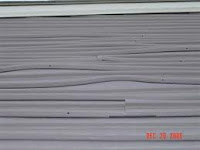
As I was doing my daily check in on Twitter the other day, I noticed a link to the http://www.thebostonchannel.com/ posting entitled: “Energy Efficient Windows Melt Vinyl Siding” Having not heard of this before, (it is not a problem that Almar clients have been experiencing) I quickly clicked the link to learn more and spent most of the rest of the day reading and on the phone to my siding manufacturers learning more about this new phenomenon.
In a nut-shell, to adhere to the new Massachusetts building codes and increasing energy regulations, when we install new or replacement windows must be energy efficient, which us defined as having Low-E or “low-emittance” glass. The way low-e windows are made can in some instances cause sunlight to reflect off of them creating a magnifying effect (also called Solar Reflection and Heat Distortion) on your siding, resulting in melting. The good news is this is infrequent problem. There are solutions and ways to prevent this from happening.
Before you get too anxious, please note that for those homeowners on the South Shore this hasn’t been a big issue, because we have so much space between our houses. This Solar Reflection problem is at its worst when houses are only a few feet apart and have a combination of other factors in addition to closeness.

According to the VSI (Vinyl Siding Institute) temperatures from 160-165 degrees Fahrenheit can start to soften normal grades of siding. The heat generated from double paned low-e window can measure in excess of 200 degrees Fahrenheit. A representative from Certainteed Siding he told me that their Cedar Impressions are a good choice because they can withstand temperatures of 300-440 degrees Fahrenheit, so it is very rare to see these melting issues with Cedar Impressions vinyl siding because of this heat tolerance.
According a NAHB (National Association of Home Builders) taskforce studying this issue in February 2010; “Glass in double paned windows may on occasion slightly warp or deflect due to a difference in barometric pressure between the interior of the glass panes and the outside air pressure. This can create a concavity in the glass. Such a concavity is a normal response to pressure differences, does not affect the performance of the window, and does not constitute a defective window condition. However, the concavity may focus sunlight reflected from the window in a fashion similar to the effect seen when light passes through a magnifying glass. The heat generated by the focused reflected sunlight has proven sufficient to visibly damage and distort vinyl siding on nearby houses. Any double paned window may cause this effect, but double paned low-e windows have a higher reflectivity quotient which can exacerbate the reflected light/vinyl distortion phenomenon.”
In conclusion, we must emphasized that there is nothing wrong with the windows or the siding. Unless there is a certain combination of environmental factors, both the windows and the siding will serve their intended purpose without any problems.
These factors include:
1. Concavity in the double glass panes
2. The angle of the sun
3. Other factors: proximity to the adjoining houses (or sidewalls), wind speeds, air temperatures, and buffering foliage.
Replacing the vinyl siding is not a permanent solution, and because you’ll still have the factors that caused the problem in the first place, both NAHB and VSI have recommended some remediation options if you are experiencing.
Options include:
1. Placing a full size screen over the window to reflect the light. (1/2 screens won’t do the job)
2. Block the reflected sunlight with an awning, trees, or shrubbery.
3. Replace damaged vinyl siding with another siding option, such as fiber cement siding.
4. There are also some vinyl siding options, such as CPVC that resist high temperatures of heat, but the current cost can be several times that of regular siding.
This article was created with information from the NAHB report and VSI’s website. It is not a substitute for professional advice. If you have questions that would be specific to your home, please feel free to contact us at Craig@AlmarBuilding.com
For more information about vinyl siding, visit the Vinyl Siding Institute (VSI) website at http://www.vinylsiding.org/
In a nut-shell, to adhere to the new Massachusetts building codes and increasing energy regulations, when we install new or replacement windows must be energy efficient, which us defined as having Low-E or “low-emittance” glass. The way low-e windows are made can in some instances cause sunlight to reflect off of them creating a magnifying effect (also called Solar Reflection and Heat Distortion) on your siding, resulting in melting. The good news is this is infrequent problem. There are solutions and ways to prevent this from happening.
Before you get too anxious, please note that for those homeowners on the South Shore this hasn’t been a big issue, because we have so much space between our houses. This Solar Reflection problem is at its worst when houses are only a few feet apart and have a combination of other factors in addition to closeness.

According to the VSI (Vinyl Siding Institute) temperatures from 160-165 degrees Fahrenheit can start to soften normal grades of siding. The heat generated from double paned low-e window can measure in excess of 200 degrees Fahrenheit. A representative from Certainteed Siding he told me that their Cedar Impressions are a good choice because they can withstand temperatures of 300-440 degrees Fahrenheit, so it is very rare to see these melting issues with Cedar Impressions vinyl siding because of this heat tolerance.
According a NAHB (National Association of Home Builders) taskforce studying this issue in February 2010; “Glass in double paned windows may on occasion slightly warp or deflect due to a difference in barometric pressure between the interior of the glass panes and the outside air pressure. This can create a concavity in the glass. Such a concavity is a normal response to pressure differences, does not affect the performance of the window, and does not constitute a defective window condition. However, the concavity may focus sunlight reflected from the window in a fashion similar to the effect seen when light passes through a magnifying glass. The heat generated by the focused reflected sunlight has proven sufficient to visibly damage and distort vinyl siding on nearby houses. Any double paned window may cause this effect, but double paned low-e windows have a higher reflectivity quotient which can exacerbate the reflected light/vinyl distortion phenomenon.”
In conclusion, we must emphasized that there is nothing wrong with the windows or the siding. Unless there is a certain combination of environmental factors, both the windows and the siding will serve their intended purpose without any problems.
These factors include:
1. Concavity in the double glass panes
2. The angle of the sun
3. Other factors: proximity to the adjoining houses (or sidewalls), wind speeds, air temperatures, and buffering foliage.
Replacing the vinyl siding is not a permanent solution, and because you’ll still have the factors that caused the problem in the first place, both NAHB and VSI have recommended some remediation options if you are experiencing.
Options include:
1. Placing a full size screen over the window to reflect the light. (1/2 screens won’t do the job)
2. Block the reflected sunlight with an awning, trees, or shrubbery.
3. Replace damaged vinyl siding with another siding option, such as fiber cement siding.
4. There are also some vinyl siding options, such as CPVC that resist high temperatures of heat, but the current cost can be several times that of regular siding.
This article was created with information from the NAHB report and VSI’s website. It is not a substitute for professional advice. If you have questions that would be specific to your home, please feel free to contact us at Craig@AlmarBuilding.com
For more information about vinyl siding, visit the Vinyl Siding Institute (VSI) website at http://www.vinylsiding.org/


